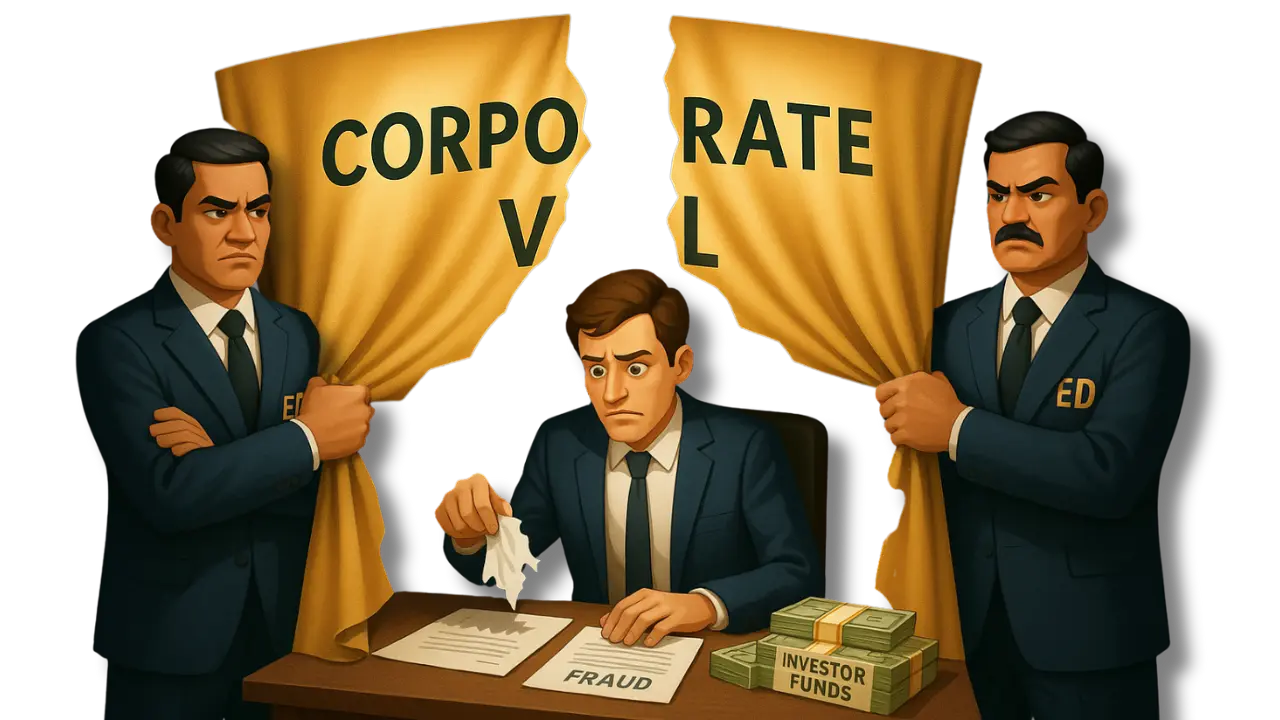Introduction
In a bustling boardroom, gleaming with ambition and innovation. Directors, armed with years of experience and sharp business acumen, make decisions that could steer their company towards unprecedented success. But what if one wrong turn, one oversight, or even an act by a rogue employee, could suddenly transform that polished boardroom into a courtroom, with criminal charges looming over their heads? This isn’t a dramatic movie script; it’s a stark reality for startup directors and seasoned corporate leaders alike in India, a reality recently underscored by the headlines surrounding the BluSmart scandal.
Earlier this year, the BluSmart controversy sent ripples of unease across the Indian startup ecosystem. Allegations of promoters misleading investors and diverting funds quickly escalated, reminding everyone that a director’s signature isn’t merely an administrative formality. It’s a testament to their legal responsibility, a potential direct line to a judicial summons. But how did we arrive at a point where corporate governance seemingly carries such inherent personal risk?
The Legal Fiction and Its Shadows
For centuries, a company has been recognized as a distinct legal entity, a “legal ghost” separate from the flesh and blood that constitute its shareholders, employees, and directors.This legal fiction, while fundamental to modern commerce, immediately begs profound questions: Can an artificial entity truly commit a crime? When does the cloak of corporate separation unravel, leaving directors exposed to personal liability? And in the realm of criminal justice, how do you enforce imprisonment against a fictitious entity?
Modern jurisprudence has largely answered the first question with a resounding “yes.” Corporations can be indicted for criminal offenses, with the caveat that they cannot possess personal malice. The “intent” of a company is often attributed to its key decision-makers, its “alter ego.” Moreover, in cases of absolute liability, where the very breach of a law triggers automatic culpability regardless of intent, a company’s prosecution becomes straightforward. The Supreme Court’s landmark 2005 ruling in Standard Chartered Bank and Ors. vs Directorate of Enforcement and Ors1. solidified this, affirming that even if the penalty for a crime is imprisonment, a company can be prosecuted, with the court having the discretion to impose a fine in lieu of physical incarceration.
But what about the individuals who steer these corporate vessels?
Boardroom Bandits or Unwitting Participants?
The corporate veil, that protective legal barrier, isn’t impenetrable. Indian courts have shown a willingness to “pierce the corporate veil” in instances of egregious misconduct, particularly fraud or tax evasion, to hold individuals personally accountable. Section 447 of the Companies Act is a potent weapon in this regard, broadly encompassing “any act, omission or concealment of any fact or abuse of position committed by any person…with the intent to deceive, gain undue advantage from, or to injure the interests of, the company…or any other person.” The sheer breadth of this provision means that almost any decision made for personal gain could be scrutinized for fraud.
Consider the harrowing tale of the Satyam Computers scandal in 2009. The company’s chairman confessed to a colossal manipulation of accounts, to the tune of over ₹7,000 crore, devastating investors and leading to criminal prosecution of the entire board. What’s truly striking is that even directors who pleaded genuine ignorance were held liable. The courts unequivocally declared: ignorance is no longer a valid shield. Nor is simply delegating responsibility. Corporate leaders, it was made clear, bear an active duty to prevent unlawful behavior and ensure compliance.
This isn’t an isolated incident. Various other regulations implicitly or explicitly impose vicarious liability on senior management. For example, Section 141 of the Negotiable Instruments Act can hold directors liable for dishonored cheques unless they can prove they had no knowledge of the offense. Similarly, under Section 16 of the Environment Protection Act, those in charge are presumed guilty in cases of corporate environmental violations. Even India’s vast and intricate employment laws can directly attribute statutory breaches to management.
However, the pendulum of justice swings both ways. In the absence of specific “deeming provisions,” directors aren’t automatically liable without concrete allegations of their personal involvement. The infamous 2G Spectrum Scam, for instance, saw trial courts initially summon not just the accused companies (like Bharti Cellular and Hutchison Max) but also their Managing Directors. Yet, the Supreme Court, in Sunil Bharti Mittal v. Central Bureau of Investigation2 quashed these summons. Why? Because there was insufficient evidence of the directors’ active role in the offenses. Mere position wasn’t enough to drag them into court.
This principle was further affirmed earlier this year in Sanjay Dutt and Ors v. State of Haryana and Anr3. When directors were implicated in the unlawful uprooting of trees by their employees, the Supreme Court quashed the order, emphasizing that “…mere authorization of an act at the behest of a company or the exercise of a supervisory role over certain actions or activities of the company is not enough to render a director vicarious liable. There must exist something to show that such [illegal] actions stemmed from their personal involvement.”
These judicial pronouncements reflect India’s embrace of the “Business Judgement Rule,” a global doctrine that protects directors acting diligently and in good faith from the repercussions of their commercial decisions. Section 463 of the Companies Act, 2013, even grants courts the discretion to discharge a director from criminal proceedings if they acted honestly and reasonably, provided there’s no negligence or conflict of interest.
The Elusive Accused: Can a Company Evade Justice?
So, if personal involvement isn’t always a given, and a company is ultimately charged with a crime, how do you compel its appearance in court? The law allows for a company to appoint a representative for trials, but notably, it’s a right, not an obligation. And if no representative appears, legal stipulations requiring the accused’s personal presence are waived.
This lacuna in the law led to a fascinating situation in 2024, when a Calcutta magistrate, attempting to force a company’s participation, issued warrants of arrest against it, hoping to attach its assets. However, the Calcutta High Court, in Hans Raj Jain vs. the State of West Bengal and Anr4., overturned this decision. Their reasoning was simple yet profound: the word “arrest” implies physical apprehension, an impossibility for a corporate body. Furthermore, a company’s constant physical presence through its registered office means it can never truly be deemed “evading trial.”
This ruling is indeed extraordinary. A warrant of arrest is typically a precursor to declaring someone an absconder and subsequently attaching their assets. If a company can never be arrested, can its assets truly be seized to compel its presence? It seems the worst outcome for a company facing trial, without the personal involvement of its directors, might simply be a potential fine.
The Double-Edged Sword of Corporate Accountability
Ultimately, India’s legal framework for corporate criminal liability is a complex tapestry. While statutes like the Companies Act, 2013, and various judicial doctrines strive to hold corporate wrongdoers accountable, the very legal fiction of a company presents immense challenges. This complexity is a double-edged sword. On one hand, robust corporate criminal liability is crucial for building trust, deterring malfeasance, and protecting stakeholders. It compels directors to invest heavily in meticulous compliance and sophisticated risk management.
On the other hand, in a nation where laws can sometimes be applied unevenly, this intricate legal landscape demands relentless vigilance from corporate leaders. For directors, compliance is no longer a mere checklist item to be ticked off. It is, unequivocally, the cornerstone of their professional existence, a continuous commitment to ethical conduct and legal adherence in a world where a single signature can hold unforeseen consequences. The BluSmart saga serves as a potent reminder: in India’s corporate arena, understanding the law isn’t just about avoiding penalties; it’s about safeguarding one’s liberty and reputation. Are you truly prepared for the courtroom, should the boardroom’s decisions lead you there?
Citations
- Standard Chartered Bank and Ors. vs Directorate of Enforcement and Ors. AIR 2006 SUPREME COURT 1301
- Sunil Bharti Mittal v. Central Bureau of Investigation AIR 2015 SUPREME COURT 923
- Sanjay Dutt and Ors v. State of Haryana and Anr. SLP (Crl) No. 7464/2024
- Hans Raj Jain vs. the State of West Bengal and Anr. CRR 196 of 2016
Exposito(s): Adv. Anuja Pandit






